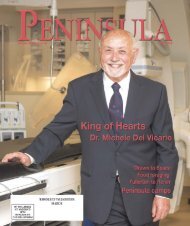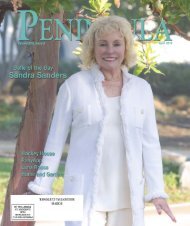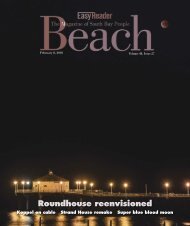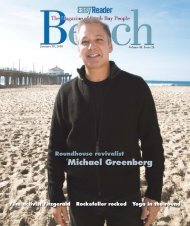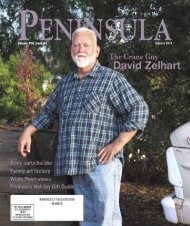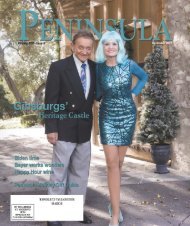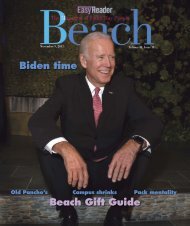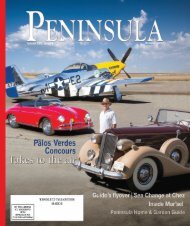You also want an ePaper? Increase the reach of your titles
YUMPU automatically turns print PDFs into web optimized ePapers that Google loves.
<strong>March</strong> <strong>2016</strong> THE <strong>Reader</strong> • 19<br />
C a m e r o n S m y t h<br />
key Supreme Court Cases<br />
Could end in 4-4 tie<br />
S C ot t w i l k<br />
in wake of aliso Canyon gas<br />
leak the Public utilities<br />
Commission needs reform<br />
by Cameron Smyth<br />
Contributing Writer<br />
by Assmemblyman Scott Wilk<br />
Contributing Writer<br />
If the upcoming Presidential election wasn’t<br />
important enough, the recent death of<br />
Supreme Court Justice Antonin Scalia has<br />
put a spotlight on one of the most critical<br />
functions of the President and the Senate —<br />
the appointment and confirmation of the<br />
members of the Supreme Court. This appointment<br />
is even more critical as the Court<br />
was viewed as a “center-right” body by a slim<br />
5-4 margin with Scalia. The loss of the most<br />
conservative member now puts the court at<br />
4-4 with several key decisions pending before<br />
it. What happens in the case of a tie<br />
vote?? The lower court’s ruling stands and in<br />
the current session that can mead heart ache<br />
for both Liberals and Conservatives.<br />
Here are a few of the cases court watchers<br />
feel are most likely to end up 4-4 along with<br />
the ruling of the previous court:<br />
Abortion: In what many are calling the<br />
most significant abortion case in decades, the<br />
court will hear a challenge to a Texas law in<br />
that in effect eliminates 75% of the abortion<br />
clinics throughout the state as a result of Legislative<br />
restrictions on abortion services...<br />
Lower court upheld the restrictions, thus the<br />
closures would proceed<br />
Immigration: A case that has received national<br />
attention, the court will consider<br />
whether the Obama Administrations executive<br />
order which protected undocumented<br />
workers from deportation and to allow them<br />
to continue to work.<br />
Lower court ruled against Administration<br />
meaning deportation can proceed<br />
Union Dues: Initiated by a case involving<br />
the California Teachers Association, the court<br />
is to decide whether public employees who<br />
choose not to join unions are still required to<br />
pay dues for the union’s collective bargaining<br />
activities.<br />
Lower court ruled in favor of Unions, requiring<br />
support for bargaining activities<br />
Laemmle<br />
Voting Districts: The 14th Amendment<br />
sets that each legislative district must contain<br />
approximately an equal number of people.<br />
However, what is being challenged is<br />
whether districts should have the same number<br />
of people or the same number of eligible<br />
voters. A ruling for eligible voters would<br />
have significant impact in California as undocumented<br />
residents would not be counted,<br />
thus diluting heavily democratic urban districts.<br />
Lower court ruled in favor of counting ALL<br />
residents, not just eligible voters<br />
Along with the fate of these and several<br />
other major cases to be decided by the<br />
Supreme Court, the greater debate is now<br />
whether President Obama should nominate a<br />
replacement or leave a vacancy for the next<br />
President. I expect Obama will make a nomination<br />
and the Senate will simply not hold a<br />
hearing, which is their right as a co-equal<br />
branch of Government. And if you think this<br />
is some Republican ploy with no precedent<br />
look no further than the following quote from<br />
Vice President Joe Biden, who is now ironically<br />
the President of the Senate, where he<br />
said in 1992 on the Senate floor: “As a result,<br />
it is my view that if a Supreme Court Justice resigns<br />
tomorrow, or within the next several<br />
weeks, or resigns at the end of the summer,<br />
President Bush should consider following the<br />
practice of a majority of his predecessors and<br />
not — and not — name a nominee until after<br />
the November election is completed”.<br />
Can’t you just picture the Presidents reaction<br />
when that CSPAN video surfaced. . . .<br />
Priceless. R<br />
Cameron Smyth is a lifelong resident of the<br />
Santa Clarita Valley who served six years on the<br />
Santa Clarita City Council before being elected<br />
to represent the Valley in the State Legislature.<br />
After leaving the Assembly in 2012, Cameron returned<br />
to the private sector and continues to reside<br />
in Newhall with his wife and three children.<br />
continued from previous page<br />
terest, which ironically received approximately<br />
a half-million dollars in<br />
city assistance to relocate to downtown<br />
Newhall.<br />
Boydston staged what amounted<br />
to a late-night filibuster, speaking for<br />
about an hour regarding his opposition<br />
to the Laemmle plan and his<br />
suggestion for a stripped-down project<br />
for the site, across the street from<br />
the Old Town Newhall Library. His<br />
long-winded soliloquy tested the patience<br />
of Mayor Bob Kellar, who<br />
twice urged Boydston to be more<br />
concise.<br />
Fortunately, the other three council<br />
members recognized that this<br />
project — which guarantees<br />
Laemmle will operate the theater for<br />
at least 15 years — will provide<br />
major economic and social benefits<br />
to Old Town Newhall.<br />
The parking structure will be for<br />
the use and benefit of everyone who<br />
visits Old Town Newhall and all of its<br />
business, and the subsidy for<br />
Laemmle represents an investment<br />
in Old Town Newhall’s future. It has<br />
become a fact of life that governments<br />
assist projects like this one,<br />
and the costs of the subsidies are recouped<br />
via future sales tax revenue.<br />
In the long run, the city will come<br />
out ahead — and so will the community.<br />
R<br />
Do you recall the last movie you rented<br />
from Blockbuster? I know I don’t!<br />
Today everyone is using Netflix, HBO<br />
GO, and ‘the cloud’ to get the latest and greatest<br />
shows and movies. But that’s how society<br />
works – huge companies and organizations<br />
become outdated and obsolete over time,<br />
eventually being surpassed by something<br />
new and innovative.<br />
As families move back in their homes after<br />
the Aliso Canyon gas leak disaster, it’s clear<br />
that the California Public Utilities Commission<br />
(CPUC) is one of these old authoritative<br />
bodies — we need something new and improved<br />
to protect Californians.<br />
Back in 1911, California voters established<br />
a Railroad Commission and in 1912, the same<br />
year California Governor Hiram Johnson was<br />
the vice presidential nominee with Theodore<br />
Roosevelt on the Bull Moose Party ticket, the<br />
Legislature expanded the Commission’s regulatory<br />
authority to include things like natural<br />
gas, electrical power, telephones, water<br />
companies, and of course it still regulated<br />
railroads. In 1946, this commission was simply<br />
renamed the California Public Utilities<br />
Commission, or CPUC. But it also expanded<br />
its regulatory power to include taxis, limousines,<br />
marine transportation and other commonly<br />
used things in the hopes that one<br />
regulatory body could best oversee these<br />
mixed services.<br />
In the century since its establishment, the<br />
utilities and industries under the oversight of<br />
the CPUC have grown and evolved to the<br />
point where the current structure of the<br />
CPUC is ineffective at best, and obsolete as<br />
worst. Ultimately, this leaves Californians<br />
without the proper regulatory protections<br />
that we all pay to have — and recent disasters<br />
highlight this.<br />
In September of 2010, a natural gas<br />
pipeline exploded into flames in a residential<br />
neighborhood in San Bruno, two miles from<br />
the San Francisco International Airport. The<br />
roar was so loud and shaking so severe, residents<br />
initially believed it was an earthquake<br />
or a jetliner had crashed. The explosion and<br />
fire killed 8 people, injured 58, destroyed 38<br />
homes and damaged 70 more.<br />
And after the radiation leak in 2012 at the<br />
San Onofre nuclear power plant, a state investigator<br />
is now looking into criminal<br />
charges against the former CPUC president,<br />
Michael Peevey, over backdoor meetings and<br />
unreported communications. Specifically, Mr.<br />
Peevey worked behind public view to push<br />
the idea that Southern California Edison, who<br />
owns the San Onofre nuclear power plant,<br />
would fund $25 million of greenhouse gas research<br />
at UCLA as a part of the $4.7-billion<br />
settlement.<br />
Most recently, Porter Ranch experienced<br />
the worst natural gas leak in U.S. history.<br />
87,000 metric tons of methane has been released<br />
into the atmosphere, and thousands of<br />
families have been displaced due to obvious<br />
health concerns. The cause of the natural gas<br />
leak was due to a breached metal pipe, however<br />
the safety valve that was removed in<br />
1979 was never replaced and Porter Ranch<br />
residents have paid the price. In SoCal Gas’<br />
2014 General Rate Case Application to the<br />
CPUC, SoCal Gas testified for increasing customer<br />
rates in order to pay for safety and risk<br />
considerations, specifically to older 1940’s<br />
era wells at the Aliso Canyon facility. In other<br />
words, the CPUC already knew there were serious<br />
safety and risk concerns with older<br />
wells at Aliso Canyon.<br />
These disasters are evidence of the CPUC’s<br />
inefficiency and failures in being a regulatory<br />
body. Privately owned electric, natural gas,<br />
telecommunications, water, railroad, rail<br />
transit, and passenger transportation companies<br />
present a very diverse portfolio of industry.<br />
Should the agency regulating UBER<br />
and hot air balloons be the same agency regulating<br />
California’s systems of natural gas and<br />
nuclear power plants? It’s become evident<br />
that the CPUC is not able to adequately juggle<br />
regulating these varied interests.<br />
This is why I joined Assemblymeber Mike<br />
Gatto, D-Los Angeles, in coauthoring an Assembly<br />
Constitutional Amendment, the Public<br />
Utility Reform Act of <strong>2016</strong>. This bill will<br />
place an initiative before voters to strike Article<br />
12 from the California Constitution,<br />
which would remove constitutional protections<br />
the CPUC so regularly enjoys. This<br />
would also require the California Legislature<br />
to reassign the regulatory functions of the<br />
CPUC by 2018.<br />
This constitutional amendment recognizes<br />
the 21st century presents different challenges<br />
that those of the 20th century. The<br />
CPUC should no longer be enshrined in the<br />
California Constitution, but instead ought to<br />
allow reform in order to reassign regulation<br />
of industries to more appropriate state bodies<br />
to provide greater accountability.<br />
The California Legislature understands the<br />
current structure of the CPUC is in dire need<br />
of modernization, and this legislation will ensure<br />
CPUC reform so all Californians get the<br />
21st century protections they pay for. R<br />
Assemblyman Wilk represents the 38th Assembly<br />
District, which encompasses Simi Valley,<br />
the northwestern section of the San<br />
Fernando Valley and most of the Santa Clarita<br />
Valley.<br />
l e t t e r S<br />
<strong>Reader</strong>s are encouraged to submit their<br />
views, reviews and questions as letters to the<br />
editor for publication in the Westside <strong>Reader</strong>.<br />
Submissions may be sent by mail or email.<br />
Letters are subject to being edited due to<br />
space constraints. Letters to the editor must<br />
include the author’s name, town and phone<br />
number for verification.<br />
Email: Info@westsidereader.com<br />
Mail To:<br />
25876 The Old Road, Suite 66<br />
Stevenson Ranch, CA 91381




